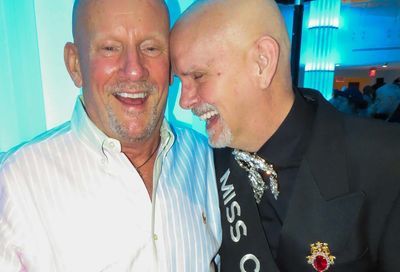 In President Barack Obama’s “end of the year” news conference, he opened by discussing the successes of the lame-duck session of Congress. In part, he mentioned the Don’t Ask, Don’t Tell Repeal Act of 2010 signing:
In President Barack Obama’s “end of the year” news conference, he opened by discussing the successes of the lame-duck session of Congress. In part, he mentioned the Don’t Ask, Don’t Tell Repeal Act of 2010 signing:
In our ongoing struggle to perfect our union, we also overturned a 17-year-old law and a longstanding injustice by finally ending “don’t ask, don’t tell.” As I said earlier today, this is the right thing to do for our security; it’s the right thing to do, period.
Later, Jake Tapper asked Obama a question that he earlier had asked White House spokesman Robert Gibbs:
I have a couple questions about “don’t ask, don’t tell.” First of all, congratulations. What was your conversation like with Marine Commandant Amos when he expressed to you his concerns and yet he said that he would abide by whatever — whatever the ruling was? Can you understand why he had the position he did? And then on the other hand, is it intellectually consistent to say that gay and lesbians should be able to fight and die for this country but they should not be able to marry the people they love?
The marriage question is one that today’s signing makes logical — and almost unavoidable. Obama answered similarly to the answers he gave AmericaBlog’s Joe Sudbay earlier this fall and The Advocate‘s Kerry Eleveld on Tuesday, Dec. 21. Obama told Tapper:
You know, I don’t want to go into detail about conversations in the Oval Office with my service chiefs. Jim Amos expressed the same concerns to me privately that he expressed publicly during his testimony. He said that there could be disruptions as a consequence of this. And what I said to him was that I was confident, looking at the history of the military with respect to racial integration, with respect to the inclusion of women in our armed forces, that that could be managed. And that was confirmed by the attitudinal studies that was done prior to this vote.
And what he assured me of — and what all the service chiefs have assured me of — is that regardless of their concerns about disruptions, they were confident that they could implement this policy without it affecting our military cohesion and good discipline and readiness. And I take them at their word. And I’ve spoken to them since the vote took place and they have all said that we are going to implement this smartly and swiftly, and they are confident that it will not have an effect on our military effectiveness.
So I’m very heartened by that. And I want to, again, give Bob Gates and Admiral Mullen enormous credit for having guided this process through in a way that preserves our primary responsibility to keep America safe and at the same time allows us to live up to our values.
With respect to the issue of whether gays and lesbians should be able to get married, I’ve spoken about this recently. As I’ve said, my feelings about this are constantly evolving. I struggle with this. I have friends, I have people who work for me, who are in powerful, strong, long-lasting gay or lesbian unions. And they are extraordinary people, and this is something that means a lot to them and they care deeply about.
At this point, what I’ve said is, is that my baseline is a strong civil union that provides them the protections and the legal rights that married couples have. And I think — and I think that’s the right thing to do. But I recognize that from their perspective it is not enough, and I think is something that we’re going to continue to debate and I personally am going to continue to wrestle with going forward.
Tapper followed up:
But the military does not recognize civil unions, right?
To which Obama responded:
I understand. And as I said, this is going to be an issue that is not unique to the military — this is an issue that extends to all of our society, and I think we’re all going to have to have a conversation about it.
I will have more on this new reality for Obama in the future.
[Photo: Obama signs the Don’t Ask, Don’t Tell Repeal Act of 2010 into law on Dec. 22. (Photo by Ward Morrison.)]



















